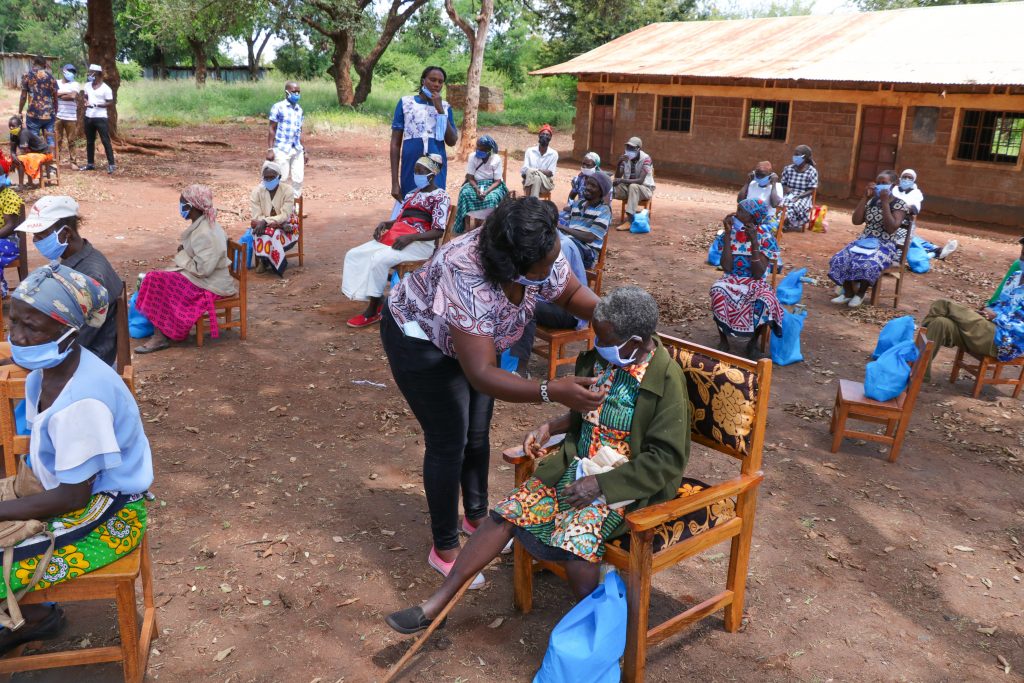Zawadi is a twenty-year-old girl from Mukuru kwa Njenga. Like many Kenyans, Zawadi has never seen a doctor. She is one of two million slum dwellers. If she would make it to the nearest healthcare facility, she would have to face long waiting hours, stockouts of essential medical supplies, and poor service. In fact, there are only 1.5 doctors for every 10.000 citizens in Kenya, and only one out of five clinicians can reliably diagnose common conditions.
As COVID-19 hits Kenya, who will be able to provide quality healthcare to millions of low-income patients like Zawadi? While public facilities struggle with capacity, and most private healthcare providers are too expensive, it is mission-driven, inclusive health enterprises who are at the forefront of catering to the needs of the most vulnerable patients. To combat the COVID-19 pandemic, they have a key role to play. But, to do this at scale, they need strong partners.
Private healthcare for the poor is not a paradox
Access Afya is one such inclusive health enterprise. Based in Kenya, they run 13 outpatient clinics, three stand-alone pharmacies and a fully-equipped lab, currently serving over 8,000 patients per month. Services range from outpatient consultations and chronic care to family planning and lab testing, all paired with financing options to fit everyone’s budget.
Access Afya’s business model proves that providing high-quality private healthcare to low-income patients is not a paradox. In fact, many patients are willing to pay for this quality treatment. They realize that long waiting hours at public facilities, or poor quality, costs them more. To make their services accessible for their patients, Access Afya has also developed innovative payment mechanisms for treatment, including health memberships, capitation offerings, microinsurance partnerships and savings integrations.
Leapfrogging to tech-enabled inclusive systems
In order to offer quality health services at affordable rates, inclusive health enterprises need to be highly efficient and innovative. To do so, they often leapfrog to very modern technologies, paired with a more agile company culture. This also puts them at an advantage when fighting the COVID-19 pandemic in low-income areas, as they can leverage these assets to address issues of awareness, availability and quality of healthcare:
- Social media can be used to spread reliable information around prevention, also countering the massive amount of fake news or misinformation. Access Afya communicates with their patients via SMS and WhatsApp. As a service during the pandemic, they use this channel to promote hygiene and behavior change and to provide digital support groups for pregnant mothers and chronic care patients. Access Afya has also teamed up with like-minded organizations to launch an initiative called “Ask a local doctor anything,” which offers answers online to patients’ most pressing questions concerning the virus.
- Frontline staff are trained through Access Afya Academy, an online training site, on how to properly conduct first-hand screening of potential COVID-19 patients. The training is in line with guidelines from the Ministry of Health, and also offers information on how to protect themselves while caring for others.
- Telemedicine helps to ensure continuous access to quality healthcare. Access Afya also plays a key role in maintaining the provision of basic healthcare during the COVID-19 pandemic. The telemedicine service mDaktari allows patients to connect with doctors from anywhere. A vital signs detector combines facial video footage with the power of machine learning to provides doctors with crucial information for providing accurate diagnoses. Chronic disease patients are supported via an online platform, allowing remote management of their disease.
However, not all interventions to tackle COVID-19 need cutting-edge technology. In fact, very basic services can already make a big difference. For example, Access Afya supports handwashing stations at strategic points in the community, where community health workers also share information on prevention. To ensure the community health workers stay safe and can adhere to proper social distancing, Access Afya equips them with personal protective equipment (PPE) offers private transportation for their commute to and from work. Each clinic has sanitizer at their entrance, and each client receives a free sanitizer or a bar of soap after each consultation.
To fight COVID-19 at scale, social enterprises need support
Access Afya’s clinics cater to 300 patients per day. Their doctors have already run 3,000 telemedicine sessions since the platform was launched in 2017. Their campaigns, SMS and social media activities on COVID-19 reach thousands of patients with trustworthy information. And they have the potential to reach many more patients, especially those who are currently left behind! To do so, Access Afya needs mission-driven and tech-savvy partners to upgrade their systems, and financing partners that provide the resources to scale and replicate. In particular, the social enterprise needs:
- Replenishment of PPE to ensure that the clinics can remain open and continue to serve patients.
- Technical support to further develop their telemedicine platform, particularly to improve usability for lower-income patients, as well as scalability of the platform.
- Cash or product donations, to be able to provide soap, sanitizers or basic medication for free to the most vulnerable patients.
- Funding for their mass campaigns, raising awareness on COVID-19 and ensuring access to reliable information.
- Social impact investment, to continue to build their business and survive a constricting funding environment.
Building the health system of the future
COVID-19 is a threat, particularly for the most vulnerable. However, it also creates opportunities to rethink and reshape current health systems.
As COVID-19 is spreading, the need for more inclusive health systems has never been more evident. If COVID-19 is not contained in urban informal settlements or rural areas, it cannot be contained on a national level, nor internationally.
Social enterprises like Access Afya cannot change an entire system alone. But they can show us the path toward a more inclusive health system. One in which Zawadi can simply use a symptom checker on her phone to understand whether she should consult a doctor. She can easily get in touch with the right doctor by using the telemedicine app on her phone, which is linked to a microinsurance account – or visit a pharmacy with telemedicine services in her community. She can grant the doctor access to her electronic patient record, and the doctor can issue an e-prescription to give her access to medicine at a pharmacy nearby. And, when in need of a hospital, waiting hours are reduced due to effective triaging. Zawadi and millions of others can receive the care and treatment they need.
This blogpost was co-authered by Dr. Aline Menden, Dismus Masheti and Melissa Menke. It is part of Endeva’s blogpost series on the role of inclusive businesses to tackle COVID-19. Endeva is currently supporting various social enterprises in their response to COVID-19, with the aim to build systems which are more inclusive, resilient and future-fit. If you would like to support or get in touch with Access Afya, please write an email to Melissa (melissa@accessafya.com).


